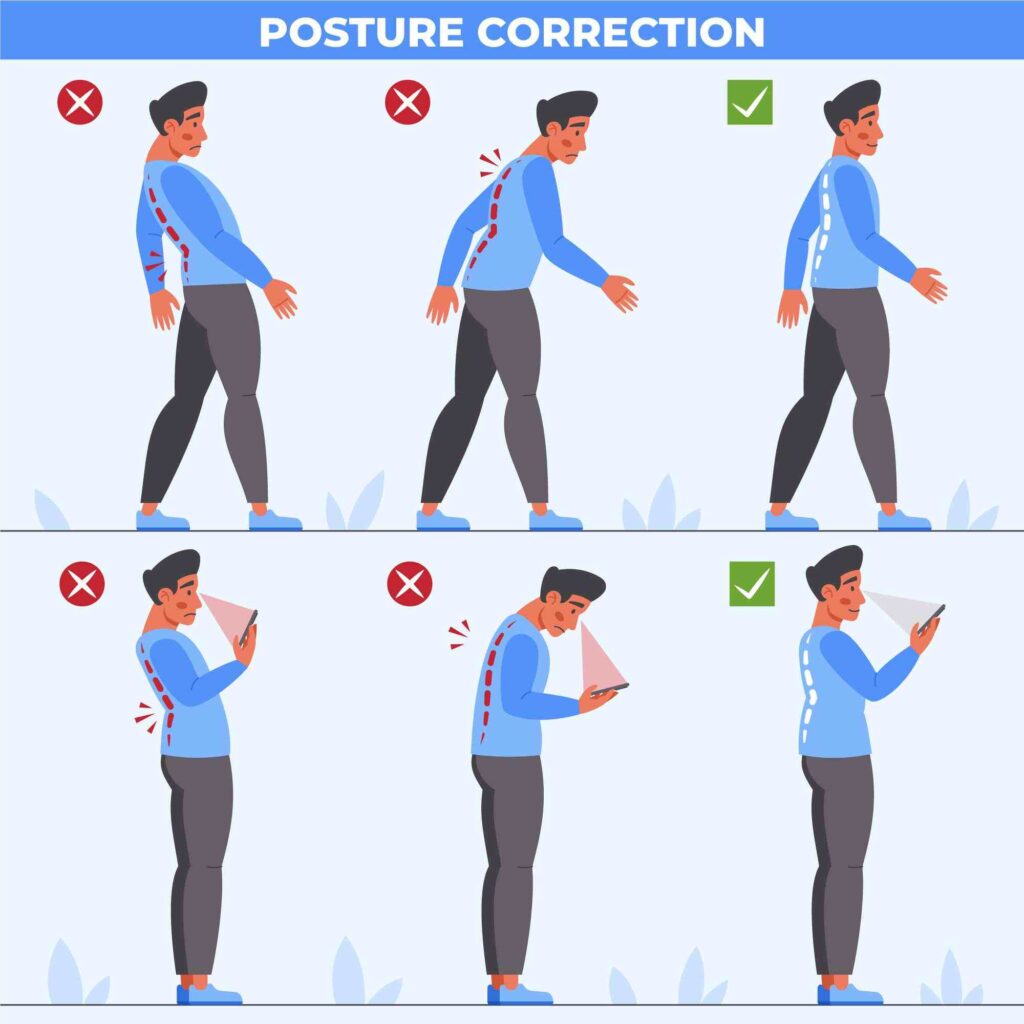Lower back pain is one of the widespread health conditions affecting millions across the globe. Poor posture, a sedentary lifestyle, or any underlying condition may cause it and thus affects your quality of life to a great extent. At PainMedics, we believe in empowering our patients with knowledge and practical solution approaches. By incorporating these eight habits into your daily routine, you can significantly reduce your risk of lower back pain and improve your overall spinal health.
Maintain Proper Posture
Poor posture is a leading cause of lower back pain. Whether sitting, standing, or walking, be mindful of your posture:
- When sitting, keep your feet flat on the floor and your back against the chair.
- While standing, distribute your weight evenly on both feet.
- When walking, keep your head up and shoulders back.
Invest in ergonomic furniture for your workspace. An ergonomic chair and a desk at the right height can make a world of difference.
Exercise Regularly
Regular physical activity is crucial for maintaining a healthy back. Aim for at least 30 minutes of moderate exercise most days of the week. Focus on exercises that strengthen your core and improve flexibility:
- Low-impact aerobic activities like swimming or walking
- Yoga or Pilates for core strength and flexibility
- Specific back-strengthening exercises like pelvic/glute bridge and cat camel pose.
Remember to start slowly and gradually increase intensity and repetitions to avoid injury.
Stretch Daily
Incorporating stretching into your daily routine can help alleviate tension and improve flexibility. Key areas to focus on include:
- Hamstrings
- Glutes and Piriformis
- Hip flexors
- Lower back muscles
Hold each stretch for 20-30 seconds before releasing it. Gradually increase the intensity.
Lift Properly
Improper lifting technique is a common cause of back injuries. When lifting:
- Bend at your knees, not your waist
- Keep the object close to your body
- Avoid twisting while lifting
- Ask for help with heavy objects
Maintain a Healthy Weight
Excess weight, especially around the midsection, puts additional strain on your lower back. Maintaining a healthy weight through a balanced diet and regular exercise can significantly reduce this stress. Include more proteins in your diet and reduce carbohydrate intake.
Get Quality Sleep
Your sleeping habits play a crucial role in back health:
- Invest in a supportive mattress and pillow
- Sleep on your side with a pillow between your knees, or on your back with a pillow under your knees
- Aim for 7-9 hours of quality sleep each night
Stay Hydrated
Proper hydration is essential for spinal health. The discs between your vertebrae are primarily composed of water. Staying well-hydrated helps maintain their shock-absorbing properties. Aim to drink 30 ml per kilogram of body weight water everyday .
Manage Stress
Stress can cause muscle tension, often manifesting as back pain. Incorporate stress-reduction techniques into your daily routine:
- Practice deep breathing exercises
- Try meditation or mindfulness
- Engage in hobbies or activities you enjoy
- Physical exercises release natural painkillers and reduce the levels of cortisol in our body.
Implementing These Habits
Building new habits takes time and consistency. Here are some tips to help you incorporate these practices into your daily life:
- Start small: Don’t try to change everything at once. Begin with one or two habits and gradually add more.
- Be consistent: Try to practice these habits at the same time each day to establish a routine.
- Use reminders: Set alarms or leave notes to remind yourself to practice good posture or take stretching breaks.
- Track your progress: Keep a journal of your habits and how your back feels. This can help you stay motivated and identify what works best for you.
- Be patient: It may take several weeks to notice significant improvements. Stay committed to the process.
When to Seek Professional Help
While these habits can significantly reduce your risk of lower back pain, they’re not a substitute for professional medical advice. If you experience persistent or severe back pain, numbness or tingling in your legs, or difficulty with bladder or bowel control, seek medical attention immediately.
At PainMedics, we’re committed to helping you achieve optimal back and spine health. Our team of experts can provide personalized advice and treatment plans tailored to your specific needs. Remember, prevention is key, but early intervention can make a significant difference when issues do arise.








